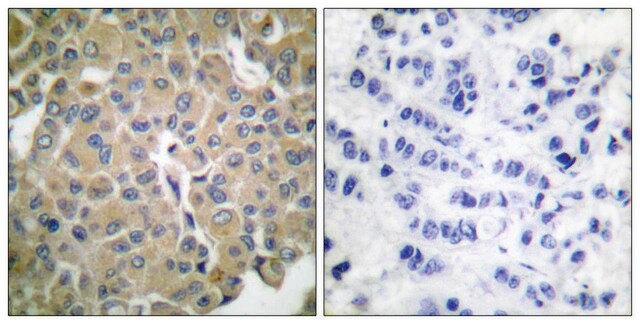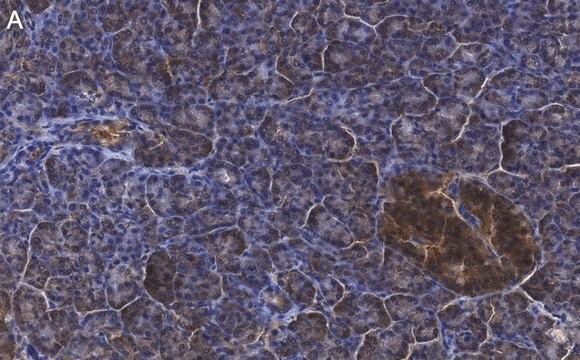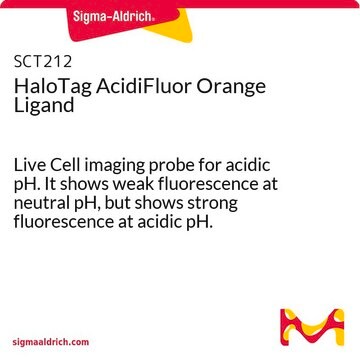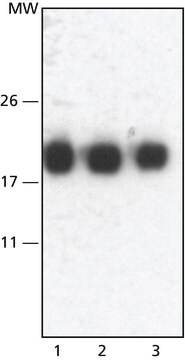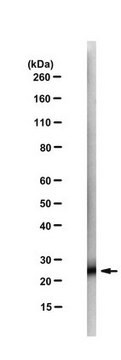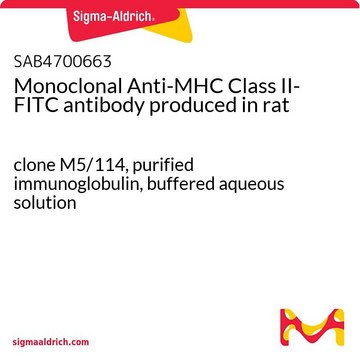General description
We are committed to bringing you greener alternative products, which adhere to one or more of The 12 Principles of Green Chemistry.This antibody is Preservative-free, produced without the harm or sacrifice of animals and exceptionally stable to allow for ambient shipping and storage if needed and thus aligns with "Waste Prevention", "Designing Safer Chemicals" and "Design for Energy Efficiency".
Click here for more information.
ZooMAb® antibodies represent an entirely new generation of recombinant monoclonal antibodies.Each ZooMAb® antibody is manufactured using our proprietary recombinant expression system, purified to homogeneity, and precisely dispensed to produce robust and highly reproducible lot-to-lot consistency. Only top-performing clones are released for use by researchers. Each antibody is validated for high specificity and affinity across multiple applications, including its most commonly used application. ZooMAb® antibodies are reliably available and ready to ship when you need them.
Specificity
Clone 1H17 is a ZooMAb® Rabbit recombinant monoclonal antibody that specifically detects MART-1. It targets an epitope within 19 amino acids from the cytoplasmic domain within the C-terminal half.
Immunogen
KLH-conjugated linear peptide corresponding to 19 amino acids from the cytoplasmic domain within the C-terminal half of human MART-1.
Application
Quality Control Testing
Evaluated by Western Blotting in SK-MEL-28 lysate.
Western Blotting Analysis: A 1:1,000 dilution of this antibody detected MART-1 in SK-MEL-28 lysate.
Tested applications
Immunocytochemistry Analysis: A 1:100 dilution from a representative lot detected MART-1/Melan-A in SK-MEL-28 cell line.
Immunohistochemistry (Paraffin) Analysis: A 1:100 dilution from a representative lot detected MART-1/Melan-A in human melanoma tissue sections.
Note: Actual optimal working dilutions must be determined by end user as specimens, and experimental conditions may vary with the end user
Evaluated by Western Blotting in SK-MEL-28 lysate.
Western Blotting Analysis: A 1:1,000 dilution of this antibody detected MART-1 in SK-MEL-28 lysate.
Target description
Melanoma antigen recognized by T-cells 1 (UniProt: Q16655; also known as MART-1, Antigen LB39-AA, Antigen SK29-AA, Protein Melan-A) is encoded by the MLANA (also known as MART1) gene (Gene ID: 2315) in human. MART-1, a melanosome-specific protein, is a single-pass type III membrane protein with a transmembrane domain (aa 27-47) and a cytoplasmic domain (aa 48-118). Its expression is restricted to melanocytes, melanoma, and retina and is absent in other tissues and tumors. It is highly enriched in early melanosomes (Stage I and/or II melanosomes) indicating that its role in early melanogenesis. It is reported to stabilize both GPCR143/OA-1 and plays a role in the expression, stability, trafficking, and processing of pre-melanosome protein (PMEL) to ensure the formation of a stage 2 melanosome. It is mainly found in the endoplasmic reticulum (ER) and Golgi but is also detected in small vesicles and tubules dispersed over the entire cytoplasm. A small fraction of the protein is inserted into the membrane in an inverted orientation, which allows melanoma cells to be effectively recognized by specific cytotoxic T-cells. MART-1 may be a useful marker in the diagnosis of melanocytic lesions and in the differential diagnosis of malignant melanoma. This ZooMAbZooMAb® recombinant monoclonal antibody, generated by our propriety technology, offers significantly enhanced specificity, affinity, reproducibility, and stability over conventional monoclonals. (Ref.: Hoashi, T., et al. (2005). J. Biol. Chem. 280(14); 14006-14016; Chen, YT., et al. (1996). Proc. Natl. Acad. Sci. USA. 93(12); 5915-5919).
Physical form
Purified recombinant rabbit monoclonal antibody IgG, lyophilized in PBS, 5% Trehalose, normal appearance a coarse or translucent resin. The PBS/trehalose components in the ZooMAb formulation can have the appearance of a semi-solid (bead like gel) after lyophilization. This is a normal phenomenon. Please follow the recommended reconstitution procedure in the data sheet to dissolve the semi-solid, bead-like, gel-appearing material. The resulting antibody solution is completely stable and functional as proven by full functional testing. Contains no biocide or preservatives, such as azide, or any animal by-products. Larger pack sizes provided as multiples of 25 μL.
Reconstitution
300 μg/mL after reconstitution at 25 μL per vial. Please refer to guidance on suggested starting dilutions and/or titers per application and sample type.
Storage and Stability
Recommend storage of lyophilized product at 2-8°C; Before reconstitution, micro-centrifuge vials briefly to spin down material to bottom of the vial; Reconstitute each vial by adding 25 μL of filtered lab grade water or PBS; Reconstituted antibodies can be stored at 2-8°C, or -20°C for long term storage. Avoid repeated freeze-thaws.
Legal Information
ZooMAb is a registered trademark of Merck KGaA, Darmstadt, Germany
Disclaimer
Unless otherwise stated in our catalog or other company documentation accompanying the product(s), our products are intended for research use only and are not to be used for any other purpose, which includes but is not limited to, unauthorized commercial uses, in vitro diagnostic uses, ex vivo or in vivo therapeutic uses or any type of consumption or application to humans or animals.


